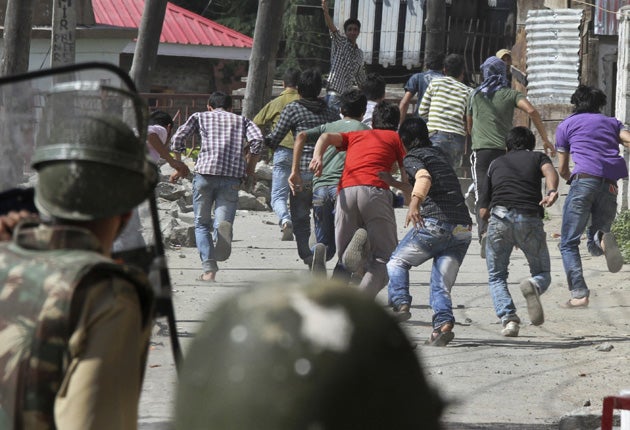Kashmir on a knife edge once again after security forces kill three youths

Your support helps us to tell the story
From reproductive rights to climate change to Big Tech, The Independent is on the ground when the story is developing. Whether it's investigating the financials of Elon Musk's pro-Trump PAC or producing our latest documentary, 'The A Word', which shines a light on the American women fighting for reproductive rights, we know how important it is to parse out the facts from the messaging.
At such a critical moment in US history, we need reporters on the ground. Your donation allows us to keep sending journalists to speak to both sides of the story.
The Independent is trusted by Americans across the entire political spectrum. And unlike many other quality news outlets, we choose not to lock Americans out of our reporting and analysis with paywalls. We believe quality journalism should be available to everyone, paid for by those who can afford it.
Your support makes all the difference.Kashmir is boiling again. The killing of three young men by security forces in the past ten days has ratcheted up tension and sent hundreds of demonstrators into the streets.
The Indian authorities have responded by deploying thousands of police and paramilitary forces.
Yesterday, the city of Srinagar, capital of the Kashmir valley, was brought to a standstill as separatists called yet another strike to protest against the killing of the young Muslim men. Police have imposed a strict curfew in an effort to halt the demonstrations that have reverberated around the city. The most recent protests date from June 11 when a 17-year-old student was killed by police as they fired at demonstrators during a routine protest in the city.
Some reports have suggested that the teenager, who was not participating in the protests, was killed after being struck by a tear-gas canister while others have suggested post-mortem tests showed he was killed by gunfire. A day after the student's death, paramilitary forces allegedly seriously beat another demonstrator. That man died from his injuries on Saturday and when friends and relatives protested against this latest killing, there was fresh violence and another person was killed and several more injured. The man killed on Sunday, Javid Malla, was said to be a neighbour of the man who was beaten and who died in hospital on Saturday.
The peaks and troughs of violence come and go in Kashmir. Since he came to office last year, the state's youthful chief minister, Omar Abdullah, has been seeking to reduce the violence emanating from the long-running insurgency and even work towards a reduction of the massive number of military personnel stationed in Kashmir. But just as militants continue to launch sporadic attacks on troops, so the security forces seem incapable of not committing incidents that trigger massive controversy; even before the three recent killings, tensions in Kashmir were high following the murder in April of three local men, whom the authorities sought to portray as militants. In truth, there was no evidence to suggest the men were anything other than innocent civilians.
Earlier this month Indian Prime Minister Manmohan Singh visited Kashmir and renewed his offer to talk with any separatist groups who renounced violence. Yet campaigners say the authorities are still addressing the issue through military means rather than politically.
"The problem is that if you have a military mind-set then these things are bound to happen. Human rights will be violated because the mindset of the Indian state is military rather than political," said Khurram Parvez, of the Jammu and Kashmir Coalition of Civil Society. "The prime minister came here and said these things but the ground reality is very different. The Indian government needs to engage in a respectful manner with the people of Kashmir."
The insurgency in Kashmir dates from the late 1980s when militants based in Pakistan stepped up cross-border attacks and increased training and support for Kashmiri separatists. Anywhere up to 80,000 people have been killed in subsequent violence and a generation of people has grown up knowing nothing but uncertainty and fear. The level of depression and mental health issues in the Kashmir valley, one of the planet's most heavily militarised areas, is massive. Resentment against India – even among those who do not wish Kashmir to become part of Pakistan, is widespread and keenly felt.
Paramilitaries involved in Sunday's fateful clashes with demonstrators claimed they had used appropriate tactics. They said protesters had tried to set fire to a bunker used by troops and surrounded an armoured vehicle. "We exercised maximum restraint. Our soldiers opened fire only in self-defence after the protesters tried to torch the bunker," said Prabhakar Tripathi, spokesman for the Central Reserve Police Force (CRPF). "The situation has been brought under control and restrictions on assembly of more than five people have been imposed in some parts of Srinagar."
Yesterday's strike and curfew, which saw shops, offices and markets closed, came as India and Pakistan prepare to hold fresh talks and push forward with dialogue that was frozen in the aftermath of the 2008 attacks in Mumbai. India's most senior diplomat, Foreign Secretary Nirupama Rao, will meet her Pakistani counterpart Salman Bashir in Islamabad on Thursday. One of the topics that will almost certainly be discussed is Kashmir, over which the two countries have fought on three occasions.
In advance of the talks, India appears to be making reasonably warm noises. One Foreign Ministry source told reporters: "We are not going there in an accusatory mode but in exploratory mode."
Join our commenting forum
Join thought-provoking conversations, follow other Independent readers and see their replies
Comments